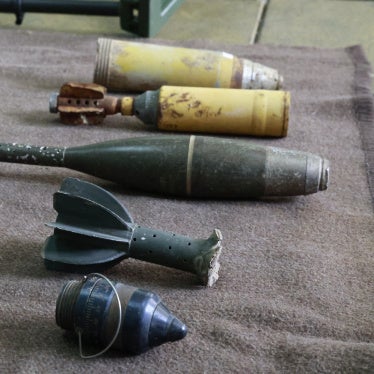Human Rights Watch today released a letter to U.S. Secretary of State Madeleine Albright urging that the U.S. administration not supply food aid to the Sudan People's Liberation Movement/Army. A bill has been introduced before the U.S. Congress that would permit such food aid.
"Food aid is inappropriate for human rights reasons," Jemera Rone, Sudan researcher at Human Rights Watch, said. "The SPLA has admitted diverting relief food intended for famine victims during the 1998 famine in southern Sudan. Giving them food aid would reward for that abusive behavior."
A copy of the letter is below.
December 10, 1999
Madeleine Albright
Secretary of State
Department of State
Room 6333
Washington, D.C. 20520
Dear Dr. Albright,
Human Rights Watch has been monitoring and condemning human rights abuses in Sudan committed by both government and rebel forces for many years. We were concerned to learn that the Administration is contemplating providing food aid to Sudan's armed opposition. We oppose this proposal on human rights grounds and ask that you use your influence to ensure that the Administration refuses to implement the permissive legislation.
The National Democratic Alliance (NDA) is the umbrella group for almost all rebel forces in Sudan. By far the largest army in the NDA is the Sudan People's Liberation Movement/Army (SPLM/A). The SPLA controls vast areas of southern Sudan and parts of the Nuba Mountains and the east. The SPLA has a history of gross abuses of human rights and has not made any effort to establish accountability. Its abuses today remain serious. This record makes any form of U.S. support, food or otherwise, wholly inappropriate and wholly out of step with the values that you have tried to inject into U.S. foreign policy.
Illustrative of the SPLA's human rights record was its summary execution of three captured Sudan government employees and one Red Crescent tracing officer in March 1999, an act which the U.S. government rightfully condemned. The SPLA refused all requests to turn over the bodies. It falsely claimed that the four were killed in crossfire during an abortive government attempt at rescue. It flatly rejected international protests, including one from the U.N. Commission on Human Rights. It never conducted a review of the incident or accounted for its crime. Instead, its representatives excoriated anyone who mentioned the incident.
Similarly in Chukudum, SPLA abuses, including summary executions, arbitrary arrests, and the theft of food, have been so widespread and persistent that they have alienated the formerly loyal local Didinga population. In January 1999 the situation came to a head, with the locals literally up in arms against the occupation of their territory by the Bor Dinka, who make up the majority of the SPLA troops and officers in Chukudum and whose families reside in nearby camps for the internally displaced. There has been intermittent fighting, with civilian casualties, ever since. Some of the civilian casualties have been from antipersonnel land mines which the SPLA has liberally used in the area. Several peace missions have come to Chukudum and made recommendations for the SPLA to rein in its abusive troops, to no avail.
The SPLA has even undercut the prospect of the local justice system addressing such abuses. One example is the case of SPLA Maj. Marial Nuor, who was investigated by the SPLA after he detained elderly foreign nuns and a priest for two weeks in 1996, causing an international uproar. Maj. Nuor, in charge of SPLA recruitment in Yirol, also in 1996 killed two soldiers and three recruits, and tortured an old man to death. He was convicted by an SPLA court martial (but only for mutiny when he evaded arrest), imprisoned briefly, and then placed under "open arrest."At the request of the old man's family, Maj. Nuor was sent back to Yirol in 1999 and tried in a civilian court. He was convicted and sentenced to five years in jail and fines. Several months later, however, the SPLA ordered him to conduct more recruitment in Yirol. After he threatened his fellow officers, bragging of his untouchability, he was transferred from Yirol. To our knowledge he suffered no other punishment.
This pattern makes the provision of any aid to the SPLA wrong, because it would support an abusive force and make the United States complicit in those abuses. Moreover, what makes supplying food aid to the SPLA particularly inappropriate is the group's routine diversion of relief food away from starving civilians. The SPLA diverted relief food even during the 1998 famine in Bahr El Ghazal --- indeed, even from its own civilian supporters. Some of this was done by individual soldiers and officers and local officials for their private profit, but the SPLA did not punish this behavior. At a meeting in May 1999 with U.N. officials and others in Mapel, Bahr El Ghazal, in southern Sudan, SPLA officers admitted that both SPLA and rogue commanders had diverted relief food during the 1998 famine. To provide food aid under these circumstances is to reward this unacceptable and deadly behavior.
Some argue that the SPLA would stop diverting relief food if it were to receive food from the international community. Past practice suggests that this is a na?e belief because it discounts the private-profit motive that lies behind much of this diversion and the SPLA's unwillingness to rein in such ventures. Moreover, providing food aid to a rebel force as a way of stopping its unremedied diversion of food aid to starving civilians would set a terrible precedent. It would encourage rebel groups throughout Africa and around the world to duplicate the SPLA's inhumane practices, knowing that the reward might be free U.S.-supplied food.
We understand that a large impetus for wanting to aid the SPLA is the Sudanese government's own abysmal human rights record. Human Rights Watch has documented that record extensively. For example, our March 1999 book-length report on Sudan highlighted such abuses as the government's banning of relief flights to famine-stricken areas for two months, which was a significant cause of the devastating 1998 famine in Bahr El Ghazal. The government is now banning relief flights in Western Upper Nile, another area made vulnerable by government military efforts to dislodge southern civilians from oil-rich areas where they happen to live. But these abuses could justify aid to the government's adversaries only if they themselves were respectful of human rights. As we have noted, the SPLA is anything but a human rights-respecting force.
Finally, we note with regret that similarly misguided policy has recently prevented the United States from playing the lead role in international fora in condemning Sudan's horrible human rights record. The misguided U.S. bombing of al Shifa factory in Khartoum in August 1998 severely hampered the U.S. government's ability to lead its allies on Sudan issues. That is because the Sudanese government seized the opportunity to portray itself as a victim, conveniently forgetting how many times its own planes have bombed southern relief locations, hospitals, and civilian villages. The result of this relative U.S. absence on the diplomatic front were weak, consensual resolutions on human rights in Sudan, negotiated by the European Union with the Sudanese government, in the U.N. Commission on Human Rights and at the U.N. General Assembly. That the Sudanese representative thanked the U.N. Commission for this resolution gives a good sense of how inadequate it was in portraying the state of human rights in Sudan. A decision by the U.S. government to take the side of the SPLA by materially aiding the forced is likely to backfire in similar ways, producing a result that no one in the U.S. Congress or the Administration wants. Regardless of how the decision is explained, it will be seen as compromising the United States as a voice on human rights in Sudan by formally aligning it with the abusive practices of the SPLA. This will further impede efforts to condemn the Sudan government's human rights record in international fora.
For all of these reasons, we urge you to use your considerable influence to ensure that the United States refrains from materially assisting the rebel forces in Sudan.
Sincerely,
Kenneth Roth
Executive Director
Peter Takirambudde
Executive Director, Africa Division
cc: Susan Rice, Assistant Secretary of State for African Affairs
Gayle Smith, Senior Director for African Affairs, National Security Council
Harold Koh, Assistant Secretary of State for Democracy, Human Rights and Labor
Eric Schwartz, Senior Director for Multilateral and Humanitarian Affairs, National Security Council








